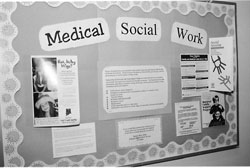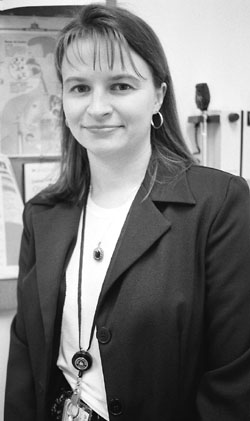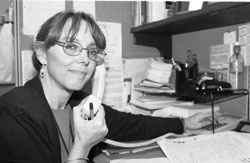|
Sacramento Area Dec. 2001
Hospitalization can be a traumatic event, especially for the elderly, the young, and those facing life threatening illnesses. Fortunately, they can turn to medical social workers for help. In the Sacramento area, Kaiser Permanente medical social workers see patients in Roseville, South Sacramento, and Central Sacramento. Either through referrals from doctors, nurses, and discharge planners, or through daily review of the hospital census, medical social workers see patients who might experience difficulties in their hospital stay or upon discharge. “At Kaiser we advocate for the patient to ensure they receive the best possible medical care, both in the hospital and after discharge,” says medical social worker David Shapiro. Medical social workers perform a variety of duties for patients. They run interference through the maze of red tape to help patients get benefits. For the elderly, they are called upon to deal with conservatorship, long-range planning, alternative living situations, board and care, or long-term custodial care. They deal with problems associated with drug and alcohol addiction, and help people get into treatment programs both at Kaiser and in the community. They help the homeless in the emergency room find shelter and transportation and help non-Kaiser members gain admittance into other institutions or into Kaiser. Medical social workers work in pediatrics, birth and prenatal, oncology, HIV, Alzhiemer's/dementia, and medical/surgery departments. Pediatrics
Just coping with hospitalization can be a very difficult task for children and parents, especially if the child is facing a life threatening illness. “My role is to be of use to the family, “ says medical social worker Rachel Allen, “whatever their needs. Maybe a parent is concerned about losing their job and needs information on the Family Medical Leave Act, or maybe they’re worried about how to talk with their child about his or her illness. I complete a needs assessment at my initial meeting, identify those areas as most urgent, and we start from there.” From the very first meeting, Allen builds trust with the child and the family. “You have to adapt according to the needs of the situation and the family,” says Allen. ”The hardest part of the job is finding enough time to spend with each child.” Once Allen understands the needs of the family she links up parents with community, economic, and social resources, acts as an advocate for the family within the hospital, and helps coordinate the medical team treating the child. “Parents frequently are faced with some very difficult choices. They could lose their job if they spent their time supporting their child, they are anxious over their child’s diagnosis, and in need of assistance dealing with insurance issues. We’re there to support the child and the family to make it through this very difficult time.” “What inspires me is the strength of the children. Sometimes, in the face of a very difficult illness, they are the strongest in the family. Parents, who often are the most stressed, are amazed at the strength and courage shown by their children.” Alzheimer’s Intervention Program
When elders suffer from Alzheimer’s, they and their care givers need immediate answers: Where can they go for help? How can they be cared for? Are they adequately prepared? Are they living alone? Is their income adequate? In the Sacramento area, if they are members of Kaiser, they will probably call Yvonne Speer, medical social worker in the Kaiser Alzheimer’s Intervention Program. Her two-person office counsels 1,400 active cases. Given the aging of the baby boomer generation, that could grow to 7,000 cases in northern California alone. Most of her clients care for family members suffering from the beginning stages of Alzheimer’s and those with acute memory loss. Many are in transition into assisted living or skilled nursing facilities. Her job is to help with that transition. “We make them aware of available care options,” says Speer, “whether adult day care, in-home care, or a nursing home. We assist families with legal, financial, and insurance issues and counsel patients and family members experiencing the grief and loss frequently associated with this illness. Elderly patients grieve the loss of their memory and their physical and cognitive functioning. The care giver grieves the loss of the relationship that they once enjoyed with their spouse or loved one. The task of care giving is a difficult one. Most people have no training. Medical social workers help family members develop a long-term care plan. “Many are fearful about losing financial and emotional support,” adds Speer. “There’s a lot of anticipatory loss when you care for someone with Alzheimer’s Disease. Spouses want to stop the progression of the disease. But it’s not a disease, like cancer, where you can jump in and be more aggressive to stop it. “Imagine you’ve been married to someone for 50-plus years, who you consider your soul mate, and who you’ve relied on for all those years. The children are grown and out of the house. You’ve just been told you could lose your spouse, there’s nothing you can do to stop it, and you have compromised health yourself. All of a sudden, as an important person in your life is in danger of slipping away, you’re faced with the prospect of living alone. “There are feelings of loneliness, isolation, and depression. Care givers seek medical treatment just to get some relief, and we encourage people to attend support groups and accept respite resources. But it’s very difficult for them to get out of the house when they’re giving 24-hour, sevenday-a-week care. Care givers might not be ready to accept help and put up all kinds of barriers to a stranger coming into their home to help them care for their loved one. “As medical social workers we must be cognizant of our client’s emotional state before we step in,” says Speer. “But eventually the job of care giving becomes so overburdened and difficult they finally say, ‘Okay, I’m ready. I’ve got to have these services now.’ That’s when we get to work.” Speer has direct experience with care giving. Her grandfather has Alzheimer’s Disease and she worked in a nursing home for two and a half years before coming to Kaiser. “I learned to enjoy working with elders and care givers.” says Speer. “I respect them and enjoy hearing their bits of wisdom and insight. They’re in a vulnerable position and need people to advocate for them so they are open and willing to share their lives with you. When you’re able to come through for them they’re very appreciative and sometimes send thank you notes. They’re just an enjoyable group to work with.” HIV Treatment
Medical social worker Susan Dorenfeld works with Kaiser
patients who have tested HIV positive. She provides individual, couples,
family, and group counseling on an out- patient basis. Testing positive for HIV can feel overwhelming. “People
are shocked and assume they’re going to die,” says Dorenfeld.
“There is a loss of a sense of well being and good health. Drug therapy
is expensive, its side effects can be overwhelming, and a person’s
overall quality of life can be diminished. The stigma of HIV is also still
there. People feel they are somehow responsible for acquiring the disease.
They feel both self-imposed shame and the shame imposed on them by others.” As treatment for the disease has advanced, patients are recovering and living longer. “Today, many patients with this disease are able to live a high quality life, even holding down high-powered jobs,” says Dorenfeld. “People who have been sick in the past are returning to work. Many find they need to adopt a different life style, which brings new challenges.” The majority of people Dorenfeld sees are gay men, but she now encounters more drug users and women. “Probably the hardest part of this job is seeing people die with whom you feel an emotional connection,” adds Dorenfeld. “It got to be so difficult, 10 years ago I took off and spent a year on the island of American Samoa. The time away helped me come to terms with the reality of death so that when I came back I was able to do this work without being emotionally overwhelmed by people in crisis. It also helps having a family and children. Sometimes you just need to get away and get taken care of yourself. “I was brought up to help others and do good in the world. I also happen to like this work a great deal. Over time, you develop close relationships with patients. Faced with a life threatening disease, most are open to connecting with you in a meaningful way. You really have an opportunity to have an impact on their lives. It’s very rewarding.”
|
||||||||||||||




